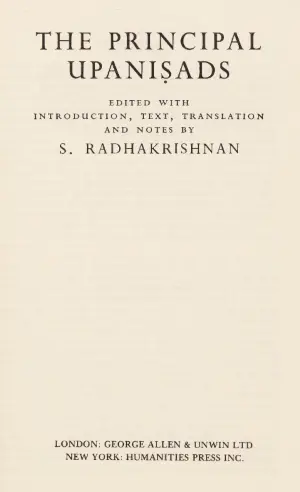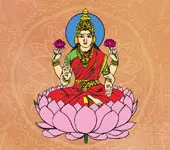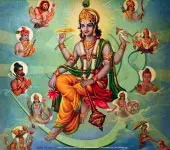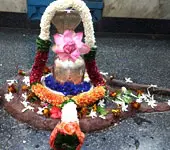Upanishads

The Aranyakas shade off imperceptibly into the Upanishads even as the Brāhmaṇas shade off into the Aranyakas. While the student (brahmacarin) reads the hymns, the householder (grihastha) attends to the Brāhmaṇas which speak of the daily duties and sacrificial ceremonies, the hermit, the man of the forest (vānaprastha), discusses the Aranyakas, the monk who has renounced worldly attachment (samnyāsin), studies the Upanishads, which specialize in philosophical speculations.
The great teachers of the past did not claim any credit for themselves but maintained that they only transmitted the wisdom of the ancients.
The philosophical tendencies implicit in the Vedic hymns are developed in the Upanishads.
Hymns to gods and goddesses are replaced by a search for the reality underlying the flux of things.
What is that which, being known, everything else becomes known?
Kena Upanishad gives the story of the discomfiture of the gods who found out the truth that it is the power of Brahman that sustains the gods of fire, air, etc.
While the poets of the Veda speak to us of the many into which the radiance of the Supreme has split, the philosophers of the Upanishads speak to us of the One Reality behind and beyond the flux of the world. The Vedic deities are the messengers of the One Light which has
burst forth into the universal creation.
They serve to mediate between pure thought and the intelligence of the dwellers in the world of sense.
When we pass from the Vedic hymns to the Upanishads we find that the interest shifts from the objective to the subjective, from the brooding on the wonder of the outside world to the meditation on the significance of the self.
The human self contains the clue to the interpretation of nature.
The Real at the heart of the universe is reflected in the infinite depths of the soul.
The Upanishads give in some detail the path of the inner ascent, the inward journey by which the individual souls get to the Ultimate Reality.
Truth is within us.
The different Vedic gods are envisaged subjectively.
'Making the Man (purusa) their mortal house the gods indwelt him.
'All these gods are in me'.
'He is, indeed, initiated, whose gods within him are initiated, mind by Mind, voice by Voice'.
The operation of the gods becomes an epiphany.
'This Brahma, verily, shines when one sees with the eye and likewise dies when one does not see.
The deities seem to be not different from Plato's Ideas or Eternal Reasons.
In the Upanishads we find a criticism of the empty and barren ritualistic religion 5 Sacrifices were relegated to an inferior position.
They do not lead to final liberation; they take one to the world of the Fathers from which one has to return to earth again in due course.
When all things are God's, there is no point in offering to him anything, except one's will, one's self.
The sacrifices are interpreted ethically.
The three periods of life supersede the three Soma offerings.
Sacrifices become self-denying acts like purusa-medha and sarva-medha which enjoin abandonment of all possessions and renunciation of the world.
For example, the Byhad-aranyaka Upanishad opens with an account of the horse sacrifice (ašva-medha) and interprets it as a meditative act in which the individual offers up the whole universe in place of the horse, and by the renunciation of the world attains spiritual autonomy in place of earthly sovereignty.
In every homa the expression svähä is used which implies the renunciation of the ego.
There is great stress on the distinction between the ignorant, narrow, selfish way which leads to transitory satisfactions and the way which leads to eternal life.
Yajña is Karma, work.
It is work done for the improvement of the soul and the good of the world, atmonnataye jagaddhitāya.
Sāmkhyāyana Brāhmaṇa of the Rg Veda says that the self is the sacrifice and the human soul is the sacrificer, puruso vai yajñaḥ, ātma yajamānaḥ.
The observance of the Vedic ritual prepares the mind for the final release if it is in the right spirit.
Prayer and sacrifice are means to philosophy and spiritual life.
While true sacrifice is the abandonment of one's ego, prayer is the exploration of reality by entering the beyond that is within, by the ascension of consciousness.
It is not theoretical learning.
We must see the eternal, the celestial, the still.
If it is unknowable and incomprehensible, it is yet realizable by self-discipline and integral insight. We can seize the truth not by logical thinking, but by the energy of our whole inner being.
Prayer starts with faith, with complete trust in the Being to whom the appeal is made, with the feeling of a profound need, and a simple faith that God can grant us benefits and is well disposed towards us.
When we attain the blinding experience of the spiritual light, we feel compelled to proclaim a new law for the world.
The Upanishad seers are not bound by the rules of caste, but extend the law of spiritual universalism to the utmost bounds of human existence.
The story of Satyakāma Jābāla, who, though unable to give his father's name, was yet initiated into spiritual life, shows that the Upanishad writers appeal from the rigid ordinances of custom to those divine and spiritual laws which are not of today or of yesterday but live forever and of their origin knoweth no man.
The words tat tvam asi are so familiar that they slide off our minds without full comprehension.
The goal is not a heavenly state of bliss or rebirth in a better world, but freedom from the objective, the cosmic law of karma and identity with the Supreme Consciousness and Freedom. The Vedic paradise, svarga, becomes a stage in the individual's growth.
The Upanishads generally mention the Vedas with respect and their study is enjoined as an important duty.
Certain verses from the Vedas such as the gāyatri form the subject of meditations and sometimes verses from the Vedas are quoted in support of the teaching of the Upanishads. While the Upanishads use the Vedas, their teaching is dependent on the personal experience and testimony of teachers like Yājñavalkya. Sāndilya.
The authority of the Vedas is, to no small extent, due to the inclusion of the Upanishads in them.
It is often stated that Vedic knowledge by itself will not do.
In the Chandogya Upanishad, Svetaketu admits that he has studied all the Vedas but is lacking in the knowledge 'whereby what has not been heard of becomes heard of, what has not been thought of becomes thought of, what has not been understood becomes understood.
Nārada tells Sanatkumāra that he has not the knowledge of the Self though he has covered the entire range of knowledge, from the Vedas to snake-charming.
Click here to read more
Recommended for you
Sri Suktam Explained-Part 10
 Click here to know more..
Click here to know more..
Do you know why mantras and prayers in Sanskrit work better?

Discover why mantras and prayers in Sanskrit are more effective than in other languages! Click here to learn the reason behind this phenomenon.....
Click here to know more..Natesha Bhujanga Stotram

santaapaghnam puraare dhuri cha tava sabhaamandire sarvadaa tvan- nri'ttam pashyanvaseyam pramathaganavaraih' saakametadvidhehi.....
Click here to know more..
English Topics
Spiritual books
Click on any topic to open
- 30 Adhyatma Ramayana - English Translation
- 29 Kathakali - The Dance Of Kerala
- 28 Varanasi Down the Ages: Tracing the Evolution of India's Spiritual Capital
- 27 Vedas With Meaning
- 26 Valmiki Ramayanam
- 25 Sapthagiri - January - 2019
- 24 Vedas On Marriage - Emancipation Of Woman
- 22 Scientific Hindu
- 21 What Is Hinduism?
- 20 Antyeshti - Death Rituals
Please wait while the audio list loads..
30
Ganapathy
Shiva
Hanuman
Devi
Vishnu Sahasranama
Mahabharatam
Practical Wisdom
Yoga Vasishta
Vedas
Rituals
Rare Topics
Devi Mahatmyam
Glory of Venkatesha
Shani Mahatmya
Story of Sri Yantra
Rudram Explained
Atharva Sheersha
Sri Suktam
Kathopanishad
Ramayana
Mystique
Mantra Shastra
Bharat Matha
Bhagavatam
Astrology
Temples
Spiritual books
Purana Stories
Festivals
Sages and Saints

